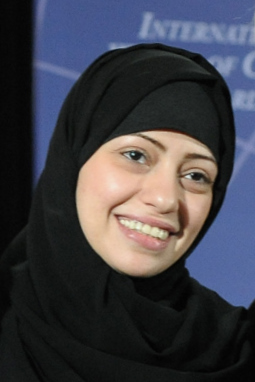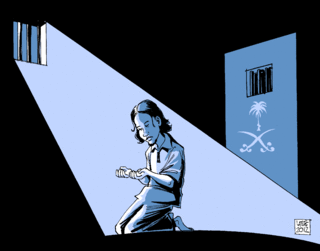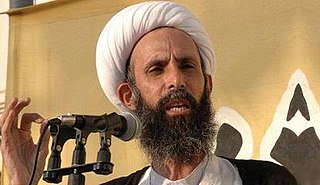
The Kingdom of Saudi Arabia is an Islamic absolute monarchy in which Sunni Islam is the official state religion based on firm Sharia law. Non-Muslims must practice their religion in private and are vulnerable to discrimination and arrest. While no law requires all citizens to be Muslim, non-Muslim foreigners attempting to acquire Saudi Arabian nationality must convert to Islam. Children born to Muslim fathers are by law deemed Muslim.

The People's Justice Party ; often known simply as KEADILAN or PKR, is a reformist political party in Malaysia formed on 3 August 2003 through a merger of the party's predecessor, the National Justice Party, with the socialist Malaysian People's Party. The party's predecessor was founded by Wan Azizah Wan Ismail during the height of the Reformasi movement on 4 April 1999 after the arrest of her husband, former Deputy Prime Minister Anwar Ibrahim. The party is one of main partners of the Pakatan Harapan (PH) coalition.

Human rights in Saudi Arabia are a topic of concern and controversy. Known for its executions of political protesters and opponents, the government of the Kingdom of Saudi Arabia has been accused of and denounced by various international organizations and governments for violating human rights within the country. An absolute monarchy under the House of Saud, the government is consistently ranked among the "worst of the worst" in Freedom House's annual survey of political and civil rights and was in 2023 ranked as the world's most authoritarian regime.
The protection of basic human rights is enshrined in Constitution of Malaysia. These include liberty of the person and prohibition of slavery and forced labour. At the national level, legislative measures that exist to prevent human rights violations and abuses can be found in acts and laws on issues that either have a human rights component or relate to certain groups of society whose rights may be at risk of being violated. Human rights groups are generally critical of the Malaysian government and the Royal Malaysia Police. Preventive detention laws such as the Internal Security Act and the Emergency Ordinance 1969 allow for detention without trial or charge and as such are a source of concern for human rights organizations like Suara Rakyat Malaysia.

Raja Petra bin Raja Kamarudin is a Malaysian blogger known for running the Malaysia Today website and publishing a series of controversial commentaries and articles on Malaysian politics in the website. He is sometimes referred to by the initials RPK. He is currently residing in Manchester, England.
The Pakistani Constitution limits Censorship in Pakistan, but allows "reasonable restrictions in the interests of the sovereignty and integrity of Pakistan or public order or morality". Press freedom in Pakistan is limited by official censorship that restricts critical reporting and by the high level of violence against journalists. The armed forces, the judiciary, and religion are topics that frequently attract the government's attention.
Shaariibuugiin Altantuyaa, a Mongolian national, was a murder victim who was either murdered by PETN and RDX explosives or was somehow killed first and her remains destroyed with explosives on 18 October 2006 in a deserted area in Shah Alam, Malaysia. Her murder case is significant in contemporary Malaysian politics due to the alleged involvement of persons close to the former Malaysian Prime Minister, Najib Razak.
Political repression of cyber-dissidents is the oppression or persecution of people for expressing their political views on the Internet.

The mass media in Malaysia includes television, radio, newspapers, and web-based media such as bloggers. Many media outlets are either owned directly by the government of Malaysia or owned by component parties of the Barisan Nasional coalition which continuously form the government during Mahathir Mohamad's tenure until May 2018. Opposition parties during this era like the Islamic Party and People's Justice Party publish their own newspapers, Harakah and Suara Keadilan respectively, which are openly sold alongside regular publications.
Censorship is a long term issue in Malaysia which has become more apparent as it attempts to adapt to a modern knowledge-based economy. Despite having in its Federal Constitution that subject to certain conditions, "every citizen has the right to freedom of speech and expression", Malaysia has consistently sat low on global indexes related to press and media freedom.
Since the launch of Twitter on July 15, 2006, there have been many notable uses for the service in a variety of environments, including political, economic, social and cultural uses. As users tweet their messages on Twitter, they encourage other people to respond and engage in online discussions as well as offline activities. User engagement on Twitter is usually measured with likes, replies and retweets and is a form of social power.
The Association of British Muslims (AoBM) is an organisation of British Muslims, initially founded in 1889 by Shaykh Abdullah Quilliam.

Samar bint Muhammad Badawi is a Saudi Arabian human rights activist. She and her father filed court cases against each other. Badawi's father accused her of disobedience under the Saudi Arabian male guardianship system and she charged her father with adhl—"making it hard or impossible for a person, especially a woman, to have what she wants, or what's rightfully hers; e.g, her right to marry" according to Islamic jurisprudence—for refusing to allow her to marry. After Badawi missed several trial dates relating to the charge, an arrest warrant was issued for her, and Badawi was imprisoned on 4 April 2010. In July 2010, Jeddah General Court ruled in Samar Badawi's favor, and she was released on 25 October 2010, and her guardianship was transferred to an uncle. There had been a local and international support campaign for her release. The Saudi NGO Human Rights First Society described Badawi's imprisonment as "outrageous illegal detention".

Hamza Kashgari Mohamad Najeeb is a Saudi poet and a former columnist for the Saudi daily newspaper Al-Bilad. In 2011, he was on a Mabahith watchlist of pro-democracy activists.

Ayatollah Sheikh Nimr Baqir al-Nimr, commonly referred to as Sheikh Nimr, was a Shia sheikh from Al-Awamiyah in Saudi Arabia's Eastern Province whose arrest and execution was widely condemned, including by governments and human rights organizations.
Sayed Zabiuddin Ansaria.k.a.Abu Hamza or Abu Jundal is an Indian Islamic militant belonging to Indian Mujahideen and Lashkar-e-Taiba. He is accused of being involved in 2008 Mumbai attacks. Zabiuddin Ansari 's name was listed in the list of "50 most wanted criminals sheltered in Pakistan" released by India on 21 May 2011. He served as the handler of the 10 LeT terrorists during 2008 Mumbai attacks.
Dissidents have been detained as political prisoners in Saudi Arabia during the 1990s, 2000s, 2010s and 2020s. Protests and sit-ins calling for political prisoners to be released took place during the 2011–2012 Saudi Arabian protests in many cities throughout Saudi Arabia, with security forces firing live bullets in the air on 19 August 2012 at a protest at al-Ha'ir Prison. As of 2012, recent estimates of the number of political prisoners in Mabahith prisons range from a denial of any political prisoners at all by the Ministry of Interior, to 30,000 by the UK-based Islamic Human Rights Commission and the BBC.

Muhammad Rizieq bin Hussein Shihab is an Indonesian Islamist cleric, the founder and leader of the Islamist group Islamic Defenders Front, which was banned by the government in December 2020. Facing criminal charges in Indonesia, he lived in Riyadh, Saudi Arabia from 2017 to November 2020. Following his return to Indonesia, he was arrested in late 2020, accused of criminal incitement for holding crowded events that violated the COVID-19 pandemic regulations.
N. Surendran s/o K. Nagarajan, commonly referred to as N. Surendran, is a Malaysian lawyer and politician who served as the Member of Parliament (MP) for Padang Serai from May 2013 to May 2018. He is an independent. He was a member and Vice President of the People's Justice Party (PKR), a component party of the Pakatan Harapan (PH) and formerly Pakatan Rakyat (PR) coalitions.
Rahaf Mohammed is a Saudi author who was detained by Thai authorities on 5 January 2019 while in transit through an airport in Bangkok, en route from Kuwait to Australia.








